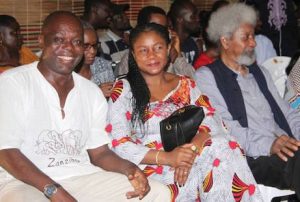By Uzor Maxim Uzoatu

Maxim, Folake and Professor Soyinka at an event, recently
It was in the gilded year of 1986 that Wole Soyinka made the astounding breakthrough as the first African writer to win the much coveted Nobel Prize in Literature.
Soyinka had just made the flight from Cornell University, New York where he was then teaching to the International Theatre Institute (ITI) in Paris to attend the executive meeting of the world body which he headed.
His plan was to spend quiet time at the apartment of his cousin Yemi Lijadu. He found his cousin giddy with joy: “The news just broke that Nigerian playwright Wole Soyinka had won the 1986 Nobel Prize for Literature, thus becoming the first African to win the coveted award.”
Even in the anonymity of his cousin’s apartment Soyinka could not hide away from the invasion of the world press. He therefore made quick plans to return immediately to Nigeria.
He wanted his entry into Nigeria as quiet and uneventful as possible, but his friends were quick to sniff out that he was on his way back home. His bosom friend, the insurance magnate Femi Johnson sent a car and driver to ferry him from the airport. Dr. Yemi Ogunbiyi and other close circle of friends ensured that the goldfish had no hiding place.
The government of Babangida provided a presidential jet for the ferrying of Nigerians to the Nobel award ceremonies in Stockholm, Sweden, even as the government was under strong suspicion of being behind the killing of ace journalist and friend of Soyinka, Dele Giwa, through a parcel bomb delivered to his home days earlier.

Soyinka’s Nobel lecture entitled “This Past Must Address Its Present” was dedicated to the then still imprisoned Nelson Mandela. Soyinka spoke to the world thus:
“A state whose justification for the continuing suppression of its indigenes, indigenes who constitute a majority on that land, rests on claims to divine selection is a menace to secure global relationships in a world that thrives on nationalism as a common denominator. Such a society does not, in other words, belong in this modern world. We also have our myths, but we have never employed them as a base for the subjugation of others. We also inhabit a realistic world, however, and, for the recovery of the fullness of the world, the black race has no choice but to prepare itself and volunteer the supreme sacrifice.”
Soyinka was conferred with the high national honour of Commander of the Federal Republic. Soyinka notes that George Bernard Shaw had said that he would readily forgive Alfred Nobel his invention of the evil dynamite but not the diabolical Nobel Prize for Literature. The aura of the prize overwhelmed Soyinka soon after the award such that he could do no other work. He hoped that the din of the Nobel would end after the crowning of the next winner only to be reminded in Cuba by novelist and 1982 Nobel Prize winner Gabriel Garcia Marquez, author of One Hundred Years of Solitude, that “It never ends, my friend. It never ends.”

He published a collection of poems, Mandela’s Earth, after winning the Nobel and celebrating the triumph of the human spirit as exemplified by Nelson Mandela of South Africa after his epic sojourn in the dreadful Robben Island Prison.
It was a bemused Soyinka who would later discover that the next three years would amount to “three lost years.”


